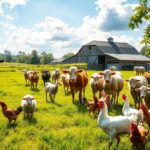Keeping farm animals healthy is key to sustainable farming. Good care for livestock improves their lives and the quality of products like meat and milk. We’ll look at important steps for farm animal health, like clean living spaces, right food, and keeping diseases away.
Key Takeaways
- Livestock producers focus on preventing sickness because treating it is expensive and time-consuming.
- Right nutrition boosts growth, reproductive health, and immune strength in animals.
- Clean and well-ventilated places are vital for animal health, especially in winter.
- Vaccines and biosecurity stop diseases from spreading.
- A clean and comfy home for livestock can cut disease by up to 30%.
Understanding Basic Farm Animal Health Requirements
Keeping farm animals healthy is key for sustainable farming. It’s important to focus on their nutrition, veterinary care, and animal welfare. These basics help animals grow well and live long lives.
Nutritional Needs
Good food is the base of animal health. For thousands of years, farmers have bred animals for better traits. This includes being more resilient to weather, reproducing well, and making less pollution.
Farmers need to give each animal the right food. This means the right mix of proteins, minerals, and vitamins. Adding supplements like oil cakes and fishmeal can fill any nutritional gaps.
Veterinary Care and Health Monitoring
Regular veterinary check-ups, vaccinations, and quick treatment of sickness or injury are vital. Watching animals every day helps spot health problems early. This means animals can get help fast.
Keeping animals safe from disease is also crucial. This includes quarantine procedures and sanitation practices. These steps help stop diseases from spreading, keeping both animals and people healthy.
| Animal Health Requirement | Importance |
|---|---|
| Balanced Nutrition | Supports growth, reproduction, and immune function |
| Routine Veterinary Care | Enables early detection and treatment of illnesses |
| Proper Biosecurity Measures | Helps prevent the spread of diseases |
By focusing on nutrition, veterinary care, and animal welfare, farmers can keep their animals healthy. This boosts the farm’s productivity and helps it stay sustainable.
Creating Optimal Living Conditions and Housing
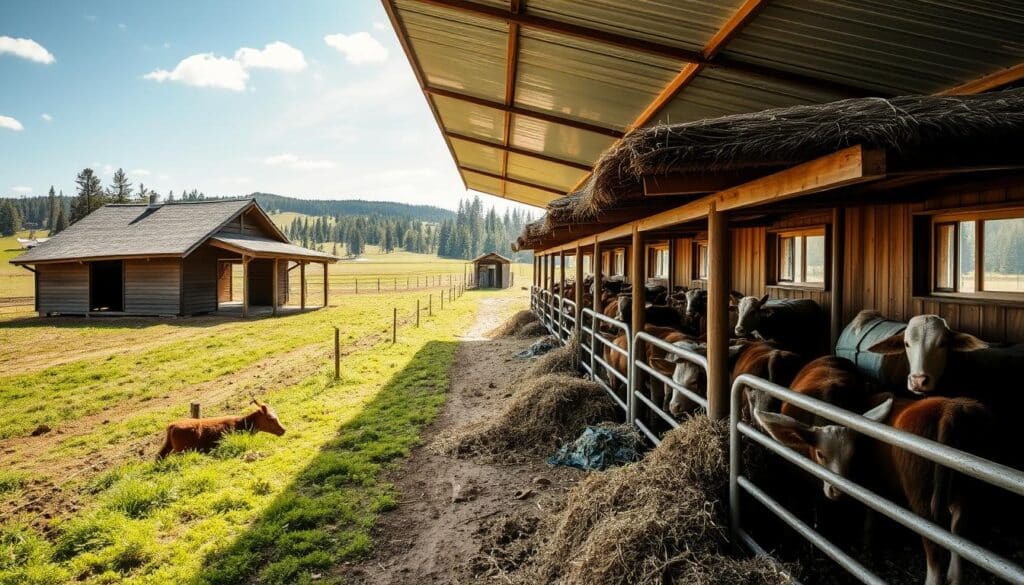
It’s key to make sure farm animals are comfortable and healthy. This means having the right animal housing, enough ventilation, and good temperature control. These things help make a great place for livestock to live.
Proper Ventilation Systems
Ventilation systems are very important. They keep the air clean and fresh. This helps control the temperature and removes bad smells like ammonia. Animals need clean air to stay healthy.
Temperature Control Measures
Keeping animals safe from too hot or too cold is important. Temperature control helps keep the right temperature inside. This keeps animals comfortable and helps them grow well.
Space Requirements for Different Species
Every animal needs different amounts of space. The rules say how much space is needed. This space lets animals move and be happy.
By focusing on good living conditions, farmers can help their animals thrive. Good animal housing, ventilation, and temperature control make animals healthier and happier. This also makes the farm more profitable.
| Animal Species | Minimum Space Requirement |
|---|---|
| Dairy Cows | 75-100 sq ft per animal |
| Beef Cattle | 40-60 sq ft per animal |
| Pigs | 8-12 sq ft per animal |
| Chickens | 1-2 sq ft per bird |
“Proper livestock housing and welfare significantly improve animal health and well-being, leading to increased productivity and profitability for farmers and ranchers.”
Farm Animal Health and Nutrition Management
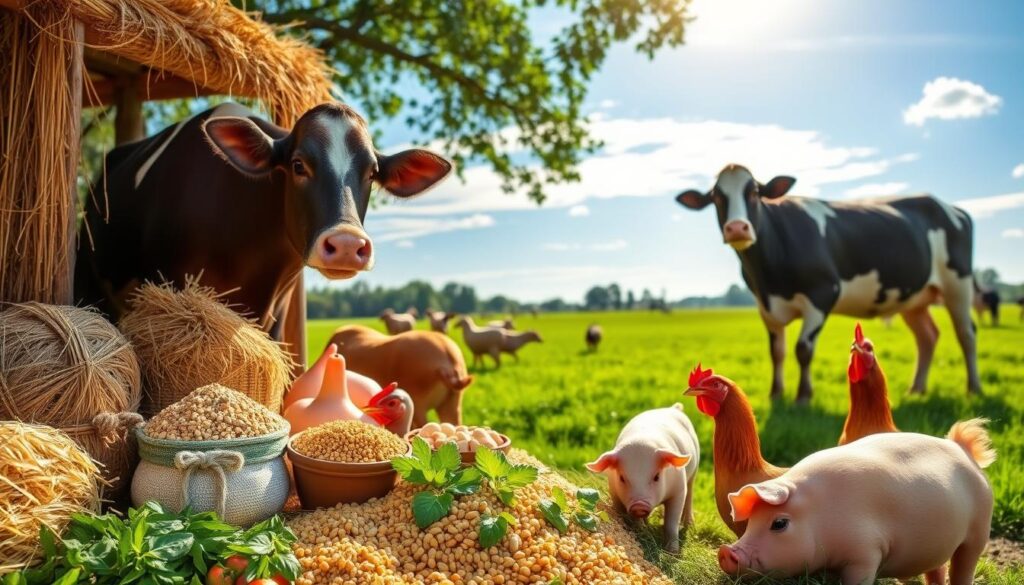
Keeping farm animals healthy is key for their productivity and long life. A balanced diet is crucial. It must meet each animal’s specific nutrient requirements based on their age, weight, and production status.
Feed testing is vital to ensure the quality of forage, grains, and supplements. The National Research Council provides guides on nutrient requirements for different farm animals. These guides help in creating effective feeding programs.
Clean, fresh water is also essential for farm animal health. Trace mineral mixtures with salt can help fix nutrient deficiencies in feed. This supports the animals’ growth, reproductive health, and immune system.
| Nutrient | Importance for Farm Animal Health |
|---|---|
| Protein | Essential for muscle development, growth, and tissue repair |
| Energy (Carbohydrates and Fats) | Provide the necessary calories for maintaining body functions and productivity |
| Vitamins and Minerals | Support immune system, bone health, and various metabolic processes |
By focusing on balanced diets, feed testing, and meeting nutrient requirements, farmers can improve animal health. This leads to better production and profits.
Disease Prevention and Biosecurity Protocols
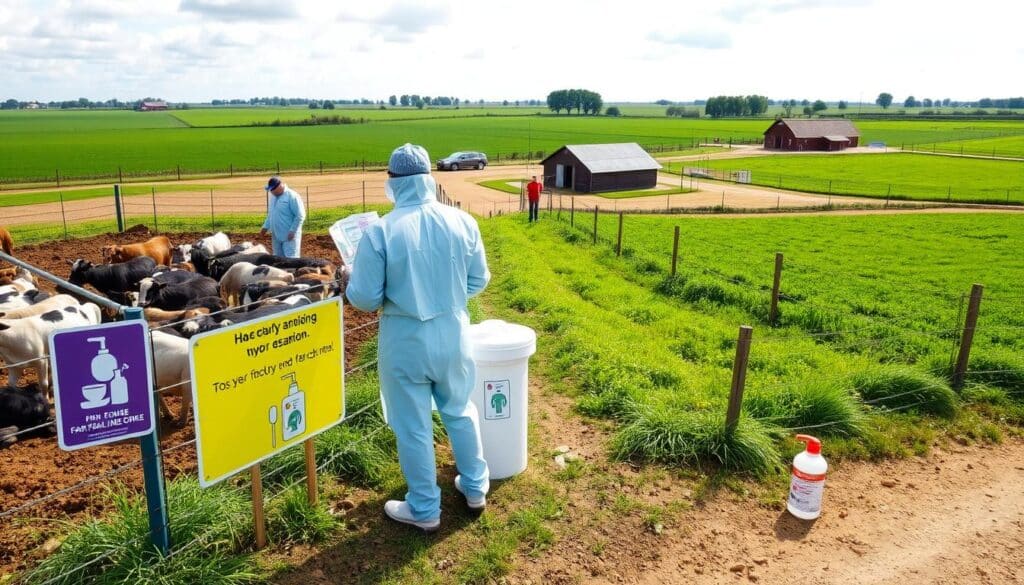
Keeping farm animals healthy is key. Disease prevention is a big part of managing livestock well. It’s important to have strong biosecurity to avoid disease outbreaks and keep your herd healthy.
Vaccination Schedules
Creating a good vaccination plan is vital. It should match your farm’s needs and disease risks. Make sure all animals get their shots on time to build strong immunity. Also, handle and store vaccines right for them to work well.
Quarantine Procedures
Quarantine is a big part of farm biosecurity. New animals or those returning from off-site should be quarantined for 21-30 days. This helps stop disease spread. Keep a close eye on them and do all needed tests before they join the herd.
Sanitation Practices
Cleanliness is key to stopping diseases. Clean and disinfect often. Proper waste management and clean water sources are also important. These steps help keep your farm clean and safe for animals.
With strong biosecurity, disease prevention, and vaccination plans, you can lower disease risks. This helps keep your farm animals healthy and happy.
“Biosecurity is the key to safeguarding animal health and preventing the devastating consequences of disease outbreaks.”
Exercise and Behavioral Health Guidelines
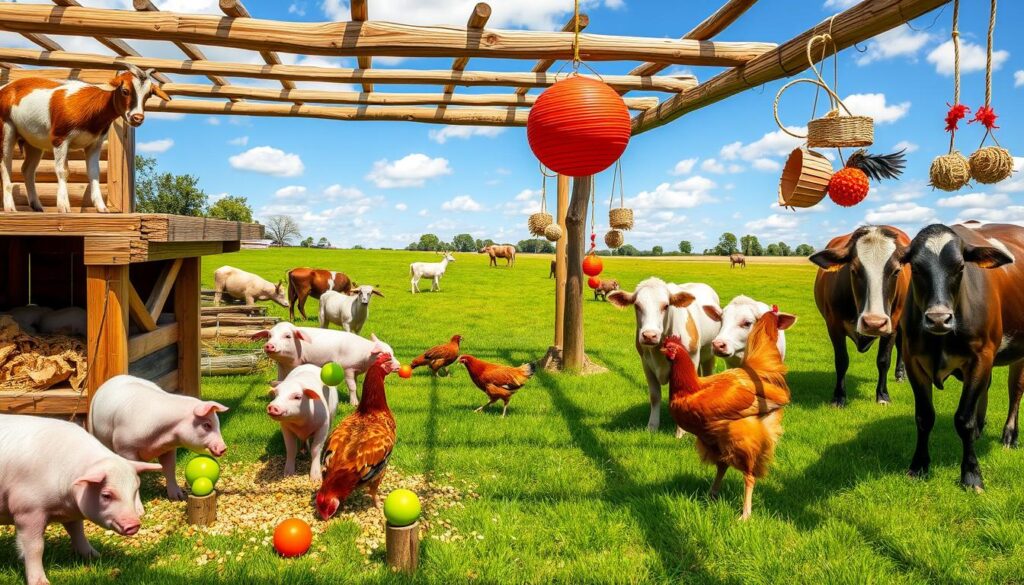
Keeping farm animals healthy is key for their well-being and work. They need enough space to move and do natural things. This helps reduce stress and makes their living space better.
Exercise and fun activities are vital for animal enrichment and stress reduction. Farmers should give animals lots of room to roam and play. This keeps them physically and mentally healthy.
- Use toys, structures, or natural things to keep animals curious and active.
- Keep routines steady and handling gentle to lower stress and create a calm place.
- Watch how animals interact often to spot and fix any behavior problems fast.
By focusing on exercise and animal health, farmers can make a great home for their animals.
“Positive reinforcement training can improve an animal’s welfare and help provide them with the best care.”
The Animal Welfare Information Center (AWIC) says social housing is crucial for lab animals. This idea also helps farm animals. It makes their lives better, reducing stress and improving their health.
Also Read: The Best Natural Remedies For Dog Allergies You Need To Know
Conclusion
Keeping farm animals healthy and happy is a big job. It needs a plan that covers food, shelter, staying healthy, and fun activities. Farmers can do a great job by following the best ways to care for animals. They also need to keep up with new ideas in animal care.
The “five freedoms” are key to making sure animals are treated right. These freedoms include having enough to eat, water, and being comfortable. They also mean being free from pain and able to act naturally. Research shows that many things, like farmer knowledge and money, play a big role in animal care.
As farming changes, it’s important for everyone to work together. Farmers, vets, and others need to follow practices that are good for animals. This helps make a better food system and keeps animals healthy and happy.
FAQs
Q: What are the essential aspects of livestock health and welfare?
A: The essential aspects of livestock health and welfare include proper nutrition, routine veterinary care, effective management of infectious diseases, adequate housing, and attention to the animal’s physical and psychological needs.
Q: How can farmers ensure the sustainability of their poultry operations?
A: Farmers can ensure sustainability in poultry operations by implementing practices such as rotational grazing, integrated pest management, and utilizing precision livestock farming to monitor health and productivity efficiently.
Q: What role does animal breeding play in improving livestock health?
A: Animal breeding plays a critical role in improving livestock health by selecting for traits such as disease resistance, reproductive efficiency, and overall resilience, thereby enhancing animal production and reducing the need for antibiotics.
Q: How can aquaculture contribute to both human health and animal health?
A: Aquaculture contributes to human health by providing a source of protein and essential nutrients, while also supporting animal health by offering sustainable fish farming practices that prevent the transmission of diseases among aquatic species.
Q: What are the common health threats to livestock and poultry?
A: Common health threats to livestock and poultry include infectious diseases such as avian influenza, foot-and-mouth disease, and salmonella, as well as environmental factors like pests and inadequate hoof care.
Q: How can farmers manage risks associated with livestock production?
A: Farmers can manage risks associated with livestock production by implementing biosecurity measures, regular veterinary check-ups, vaccination programs, and monitoring animal health indicators to catch issues early.
Q: What is the significance of the One Health approach in animal care?
A: The One Health approach is significant in animal care as it emphasizes the interconnectedness of human health, animal health, and environmental health, promoting a collaborative effort in preventing and controlling health risks that affect all three domains.
Q: How can precision livestock farming improve animal productivity?
A: Precision livestock farming improves animal productivity by utilizing technology to monitor individual animal behavior, health, and environmental conditions, allowing for tailored management practices that enhance overall performance and welfare.
Q: What are some low-cost strategies for maintaining the health of farm animals?
A: Low-cost strategies for maintaining the health of farm animals include proper nutrition management, regular health assessments, maintaining clean and safe living conditions, and educational training for farm staff on animal care best practices.
Q: Why is hoof care important for livestock health?
A: Hoof care is important for livestock health as it prevents lameness, which can significantly impact an animal’s ability to graze, reproduce, and produce milk or meat, thereby affecting overall productivity and welfare.
Source Links
- https://extension.psu.edu/keeping-animals-healthy
- https://www.nelsonmfg.com/important-tips-for-raising-healthy-and-happy-animals-livestock-care/
- https://pasture.io/farm-animal-health
- https://www.cdc.gov/healthy-pets/about/farm-animals.html
- https://www.bivatec.com/blog/the-importance-of-maintaining-proper-livestock-housing-and-welfare
- https://wiseias.com/farm-animal-housing-productivity/
- https://www.euronit.ie/en-ie/blog/228359/
- https://www.merckvetmanual.com/management-and-nutrition/management-and-nutrition-introduction/overview-of-management-and-nutrition-in-animals
- https://partnerships.ncsu.edu/wp-content/uploads/2021/03/AHNC_Request-for-Proposals-2021.pdf
- https://agr.illinois.gov/animals/animalhealth/biosecurity-measures.html
- https://ag.umass.edu/crops-dairy-livestock-equine/fact-sheets/biosecurity-guidelines-for-animal-industries
- https://www.nal.usda.gov/animal-health-and-welfare/behavioral-management-animals
- https://www.frontiersin.org/journals/animal-science/articles/10.3389/fanim.2021.638782/full
- https://www.frontiersin.org/journals/animal-science/articles/10.3389/fanim.2023.1214889/full
- https://pmc.ncbi.nlm.nih.gov/articles/PMC7552314/
- https://www.wellbeingintlstudiesrepository.org/cgi/viewcontent.cgi?article=1035&context=acwp_faafp




